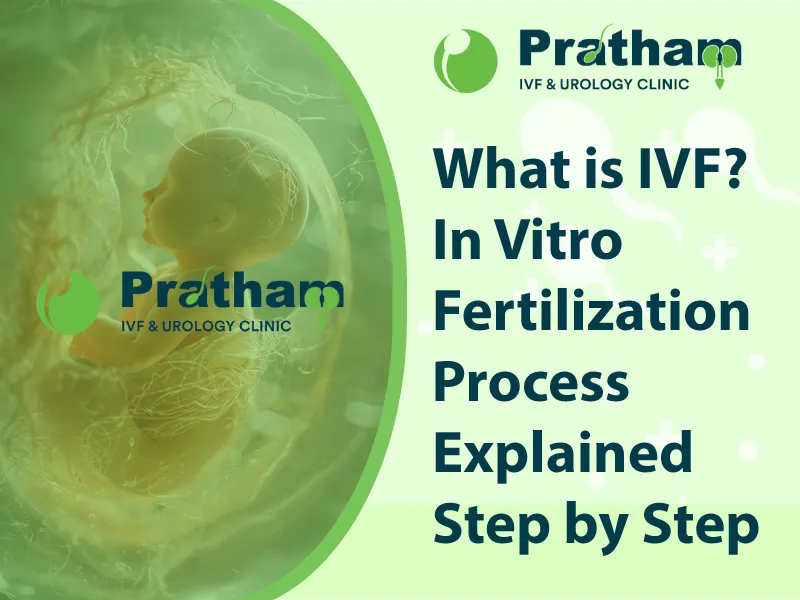
In vitro fertilization (IVF) is a medical procedure that assists individuals and couples facing fertility challenges in conceiving. It involves combining eggs and sperm outside the body to create embryos, which are then implanted into the uterus. IVF is a breakthrough treatment for couples struggling with infertility, offering hope where natural conception may not be an option. The IVF process is carefully designed and involves multiple stages, including ovarian stimulation, egg retrieval, fertilization, embryo culture, and embryo transfer, to increase the chances of a successful pregnancy.
IVF has become a widely used and effective method for treating infertility, with millions of babies born worldwide through this technique. The process can be emotionally and financially challenging, but for many couples, it offers the chance to build a family. If you’re considering IVF, it’s crucial to choose a trusted fertility clinic with high success rates. Pratham IVF Center is the best IVF center in Ahmedabad, providing personalized care and advanced treatments to help you achieve your dream of parenthood. Understanding the IVF process and exploring your options are the first steps toward your fertility journey.
Who Can Benefit from IVF?
IVF can benefit individuals and couples facing a variety of infertility issues. Some of the most common reasons for opting for IVF include:
- Blocked or Damaged Fallopian Tubes: Women with blocked or damaged fallopian tubes may find it difficult for the egg to travel to the uterus. IVF bypasses this issue by directly implanting the embryo into the uterus.
- Male Infertility: IVF can help men with low sperm count or poor sperm motility by using sperm directly from the male partner or a sperm donor.
- Endometriosis: Women with endometriosis may experience difficulty getting pregnant due to scarring or adhesions in the reproductive organs. IVF can help by bypassing these obstacles.
- Ovulation Disorders: Women with ovulatory disorders, such as polycystic ovary syndrome (PCOS), may struggle to release eggs. IVF can help stimulate ovulation and facilitate conception.
- Unexplained Infertility: In other situations, the actual reason of infertility remains known. When other reproductive treatments fail, IVF is typically suggested.
- Same-Sex Couples and Single Women: IVF allows same-sex couples and single women to have biological children, often using a sperm or egg donor.
IVF offers hope to many who face fertility challenges, and it has helped millions of families achieve their dreams of parenthood.
IVF Process Explained Step by Step
The IVF process is a comprehensive set of stages designed to increase the chances of success. Below is a step-by-step guide to the traditional infertility treatment technique:
- Consultation and Initial Testing: Before starting IVF, a consultation with a fertility specialist is essential. During this visit, your doctor will discuss your medical history, conduct necessary tests, and develop a personalized treatment plan. Testing typically includes blood work, ultrasound scans, and semen analysis for the male partner.
- Ovarian Stimulation: Ovarian stimulation is the first major step in the IVF process. During this period, the woman receives injections of estrogen every 8-14 days in order for her ovaries to produce many egg. The goal is to retrieve several eggs for fertilization, as not all will result in a successful pregnancy. Frequent monitoring through blood tests and ultrasounds helps track the progress of follicle development.
- Egg Retrieval: Once the eggs are mature, a minor surgical procedure called egg retrieval (aspiration) is performed. Under sedation, the doctor uses a needle to collect the eggs from the ovaries. This is a non-invasive technique that normally takes around 20 minutes.
- Sperm Collection: The male partner's sperm is retrieved on the exact same day as the egg retrieval. If there are issues with sperm quality, sperm can be sourced from a donor. The male reproductive system is properly treated and prepared for the process of reproduction.
- Fertilization: The eggs and sperm are combined in the lab for fertilization. In some cases, especially with male infertility, a technique called Intracytoplasmic Sperm Injection (ICSI) is used, where a single sperm is injected directly into an egg. The fertilized eggs are then watched to make sure that the embryo develops healthily.
- Embryo Culture and Monitoring: The embryos are cultured in the lab for 3–5 days, allowing them to develop further. The embryologist monitors their growth and quality, selecting the best embryos for transfer. At this stage, genetic testing can also be performed to ensure the embryos are healthy.
- Embryo Transfer: The highest-quality eggs are chosen for implantation into the woman's uterus. This is a pretty straightforward operation that does not require anesthetic. The doctor uses a thin catheter to place the embryo(s) into the uterine cavity, where implantation will occur if the pregnancy is successful.
- Pregnancy Testing: About 10–14 days after the embryo transfer, a blood test is performed to check for pregnancy. If the test is positive, further ultrasounds will be done to confirm the pregnancy and monitor fetal development.
Risks and Side Effects of IVF
While IVF is generally safe, there are potential risks and side effects to be aware of, including:
- Ovarian Hyperstimulation Syndrome (OHSS): This condition happens when reproductive medications promote the ovaries sufficiently. It can cause swelling and discomfort, but it is typically manageable.
- Multiple Pregnancies: When a number of embryos is transplanted during IVF, the risk of multiple pregnancies (twins, triplets, etc.) rises. Multiple pregnancies carry a higher risk of complications.
- Ectopic Pregnancy: In rare cases, the embryo may implant outside the uterus, leading to an ectopic pregnancy, which requires medical intervention.
- Emotional Stress: IVF can be emotionally taxing due to the physical demands, the emotional rollercoaster of the process, and the financial burden it may place on couples.
Natural IVF Cycle
In contrast to traditional IVF, Natural IVF uses minimal stimulation to allow the woman’s body to naturally produce one or two eggs. This approach is less invasive and can be ideal for women with fewer eggs or those who want to avoid the use of hormones. The success rates for Natural IVF are typically lower, but it can be a good option for certain individuals.
Risks of IVF
Though IVF offers many benefits, it comes with some risks:
- Multiple Births: IVF increases the risk of multiple pregnancies, which carry greater risks for both mother and baby.
- OHSS: As mentioned earlier, the stimulation process can cause the ovaries to swell excessively.
- Emotional Stress: IVF can be emotionally challenging, especially if the cycle is unsuccessful. Couples may experience anxiety, depression, and stress.
Success Rates of IVF
IVF success rates vary depending on a number of variables, including:
- Age: Younger women tend to achieve greater success than older women.
- Cause of Infertility: Success rates can vary depending on the underlying cause of infertility.
- Embryo Quality: The quality of embryos plays a significant role in IVF success.
- Previous IVF Cycles: Couples who have undergone previous IVF cycles may have varying success rates based on their experience.
On average, the success rate for IVF is around 40% for women under 35 and decreases with age.
Cost of IVF
The cost of IVF might vary greatly based on many factors.:
- Location: IVF treatment costs differ from country to country and clinic to clinic.
- Treatment Protocol: The type of treatment (such as standard IVF, ICSI, or egg/sperm donation) can impact the cost.
- Additional Services: Services like genetic testing, medication, and egg/sperm freezing may increase the overall cost.
It’s important to consider the total financial investment and any available financial assistance programs when planning for IVF treatment.
Why Choose Pratham IVF Center for IVF Treatment in Ahmedabad
Pratham IVF Center is one of the leading IVF centers in Ahmedabad, known for providing personalized and compassionate fertility care. Our team of highly experienced fertility specialists, embryologists, and healthcare professionals is dedicated to offering the best possible treatment for couples facing infertility challenges. We use the latest technology and advanced techniques to provide the highest chances of success in IVF treatments.
We understand that each patient’s needs are unique, which is why we create customized treatment plans based on your circumstances. Our IVF center is equipped with innovative facilities to provide comprehensive fertility care, including IVF, ICSI, egg/sperm donation, and more. Pratham IVF Center is one of the greatest options for people searching for fertility treatments in Ahmedabad, especially to its high success rate and patient-first approach. Let our experts guide you on your journey to parenthood.
Conclusion
IVF is a life-changing treatment that offers hope to many individuals and couples struggling with infertility. By understanding the process, risks, costs, and success rates, you can make an informed decision about your fertility journey. If you are looking for IVF or seeking more information, schedule your appointment today at Pratham IVF Center Ahmedabad. Call +91 98797 80105 to get personalized consultation and expert guidance on your fertility treatment options. Let our dedicated team help you take the first step toward your dream of parenthood.
 Ahmedabad Top Rated IVF Center
Ahmedabad Top Rated IVF Center




